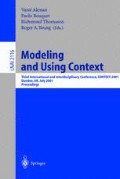Abstract
Despite its widely acknowledged importance context has remained a relatively vague concept in vision research. Previous approaches regard context primarily as a determinant for the interpretation of sensory information on the basis of previously acquired knowledge. In this paper we propose a complementary perspective, by showing that context also specifically affects learning, that is the acquisition of knowledge and the way in which such knowledge is mentally represented. In two pattern-category learning experiments we explored how complementary manipulations of context affect learning performance and generalization. In both experiments, generalization performance was measured as the ability to transfer acquired class knowledge to the contrast-inverted versions of the learning patterns. We then modelled the behavioural data in terms of evidence-based classification. Such an analysis allows to reconstruct combinations of non-relational and relational pattern attributes that provide potential solutions of a given classification problem. We show that ‘context’ in category learning affects the search within the search space of attribute combinations which underlie the production rules for the categories. Our results suggest a novel, context-based explanation for well-known phenomena of contrast-invariance in visual perception.
Access this chapter
Tax calculation will be finalised at checkout
Purchases are for personal use only
Preview
Unable to display preview. Download preview PDF.
References
Bruner, J.: On perceptual readiness. Psychological Review 64 (1957) 123–152
Soloman, R.L., Postman, L.: Frequency of usage as a determinant of recognition thresholds for words. Journal of Experimental Psychology 43 (1951) 195–201
Miller, G.A., Bruner, J.S., Postman, L.: Familiarity of letter sequences and tachistoscopic identification. Journal of General Psychology 50 (1954) 129–139
Bruner, J., Postman, L.: On the perception of incongruity: a paradigm. Journal of Personality 18 (1949) 206–223
Pylyshyn, Z.: Is vision continuous with cognition? The case for cognitive impenetrability of visual perception. Behavioral and Brain Sciences 22 (1999) 341–423
Clowes, M.B.: On Seeing Things. Artificial Intelligence 2 (1971) 79–116
Shirai, Y.: Analyzing intensity arrays using knowledge about scenes. In: Winston, P.H. (ed.): Psychology of Computer Vision. MIT Press, Cambridge, MA (1975).
Freuder, E.C.: Knowledge-Mediated Perception. In: Nusbaum, H. C., Schwab, E. C. (eds.): Pattern Recognition by Humans and Machines: Visual Perception. Academic Press, Orlando (1986)
Riseman, E.M., Hanson, A.R.: A methodology for the development of general knowledge-based vision systems. In: Arbib, M.A., Hanson, A.R. (eds.): Vision, Brain, and Cooperative Computation. MIT Press, Cambridge, MA (1987)
Grimson, W.: The combinatorics of object recognition in cluttered environments using constrained search. Aritifical Intelligence 44 (1990) 121–165
Rosch, E.: Principles of categorization. In: Rosch, E., Lloyd, B. (eds.): Cognition and Categorization. Erlbaum, Hillsdale, NJ (1978) 27–48
Jüttner, M., Caelli, T., Rentschler, I.: Evidence-based pattern classification: a structural approach to human perceptual learning and generalization. Journal of Mathematical Psychology 41 (1997) 244–259
Rentschler, I., Jüttner, M., Caelli, T.: Probabilistic analysis of human supervised learning and classification. Vision Research 34 (1994) 669–687
Watson, A.B., Barlow, H.B., Robson, J. G.: What does the eye see best? Nature 302 (1983) 419–422
Rentschler, I., Caelli, T.: Visual representations in the brain: inferences from psychophysical research. In: Haken, H. (ed.): Synergetics of Cognition. Springer, Berlin (1990) 233–248
Westheimer, G.: Lines and Gabor functions compared as spatial visual stimuli. Vision Research 38 (1998) 487–491
Jüttner, M., Rentschler, I.: Reduced perceptual dimensionality in extrafoveal vision. Vision Research 36 (1996) 1007–1021
Jüttner, M., Rentschler, I.: Scale invariant superiority of foveal vision in perceptual categorization. European Journal of Neuroscience 12 (2000) 353–359
Jain, A.K., Hoffman, D.: Evidence-based recognition of objects. IEEE Transactions on Pattern Analysis and Machine Intelligence 10 (1988) 783–802
Caelli, T., Dreier, A.: Variations on the evidence-based object recognition theme. Pattern Recognition 27 (1994) 185–204
Phillips, R. J.: Why are faces hard to recognize in photographic negative? Perception & Psychophysics 12 (1972) 425–426
Hayes, A., Morrone, M.C., Burr, D.C.: Recognition of positive and negative bandpass-filtered images. Perception 15 (1986) 595–602
Author information
Authors and Affiliations
Editor information
Editors and Affiliations
Rights and permissions
Copyright information
© 2001 Springer-Verlag Berlin Heidelberg
About this paper
Cite this paper
Jüttner, M., Rentschler, I. (2001). Context Dependency of Pattern-Category Learning. In: Akman, V., Bouquet, P., Thomason, R., Young, R. (eds) Modeling and Using Context. CONTEXT 2001. Lecture Notes in Computer Science(), vol 2116. Springer, Berlin, Heidelberg. https://doi.org/10.1007/3-540-44607-9_16
Download citation
DOI: https://doi.org/10.1007/3-540-44607-9_16
Published:
Publisher Name: Springer, Berlin, Heidelberg
Print ISBN: 978-3-540-42379-9
Online ISBN: 978-3-540-44607-1
eBook Packages: Springer Book Archive

